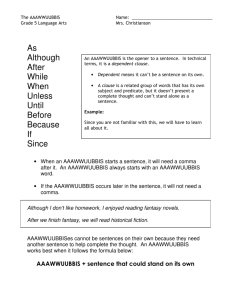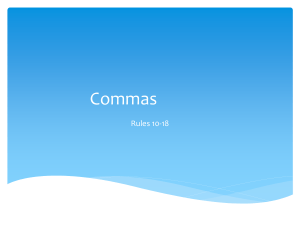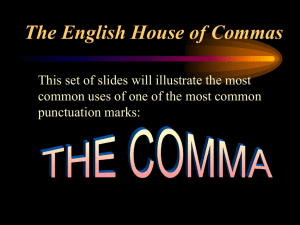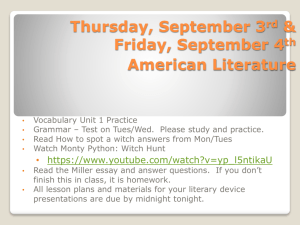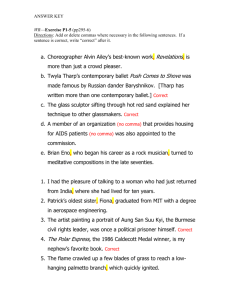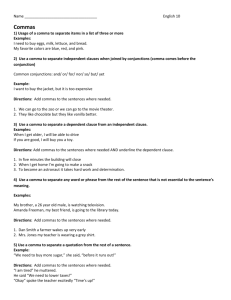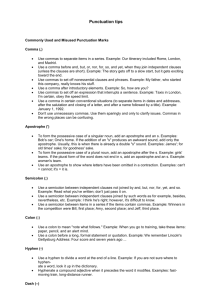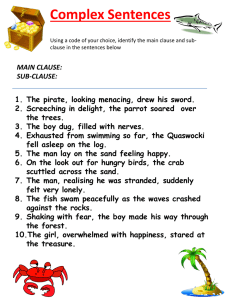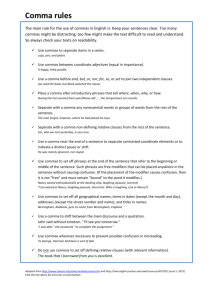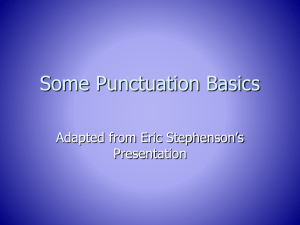Mini-lessons for Clocking
advertisement
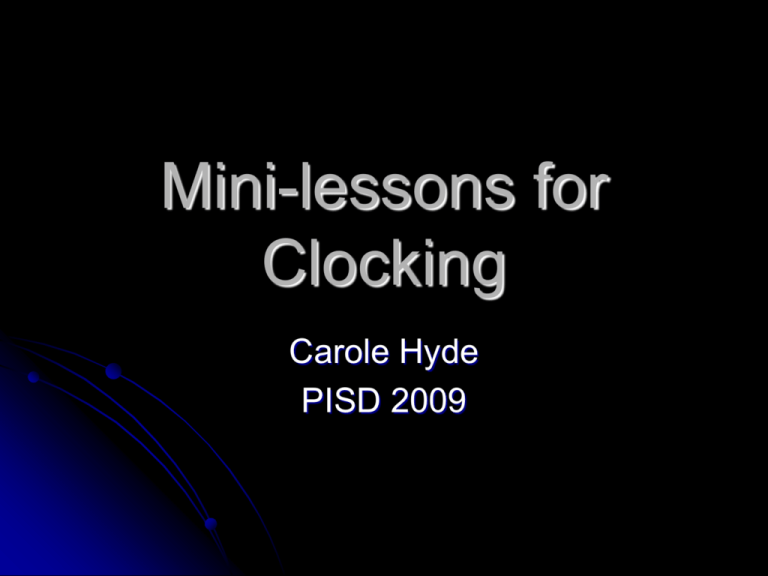
Mini-lessons for Clocking Carole Hyde PISD 2009 Punctuation Surrounding Dialogue Each time a new speaker speaks, a new paragraph should begin. Everything a character says should be in quotation marks. Use a comma to separate explanatory phrases. Place an !, ?, or . inside the closing quotation mark. Put a comma instead of a period if the quotation does not end the sentence. Example: “Don’t fall down the hill!” Jack exclaimed. Jack said, “Jill, let’s go up the hill.” “We need a pail of water,” said Jill. Dialogue Does all dialogue have quotation marks around it? “I gave him his medicine at noon,” she confirmed. Jackie mumbled under her breath, “But not all of it.” “What did you say?” she snapped. Dialogue Practice I knew she wouldn't come. She is always flaking out Jenny complained. What time are we supposed to be going tonight I asked? She lifted her head up from her phone and replied around midnight. Isn’t that kind of late I said. 5 Reasons to Begin a New Paragraph 1. change in speaker 2. change in setting 3. change in subject 4. change in time 5. change in person or thing doing the verb Run-on Sentences When two or more complete sentences are joined together without the proper punctuation Example: I put small braids in my sister’s hair she is short and skinny. What would make this correct? I put small braids in my sister’s hair. She is short and skinny. Even better, how could you combine these sentences? I put small braids in my short and skinny sister’s hair. Independent Clause (This slide is for the purpose of note taking only. Do not clock for errors until next slide) An independent clause is a group of words that contains a subject and verb and expresses a complete thought. An independent clause is a sentence. Example: The child became placid as the mother condemned her behavior. Dependent Clause/AKA- the FRAGMENT (Don’t rotate. Use same clocker from last slide) A dependent clause is a group of words that contains a subject and verb but does not express a complete thought. A dependent clause cannot be a sentence. Often a dependent clause is marked by a dependent marker word. Examples: When Jim studied in the Sweet Shop for his chemistry quiz. After she said those horrible things. How could you fix this? After she said those horrible things, she felt remorse for not holding her tongue. . ! ? .- goes at the end of a complete thought ! – goes at the end of something being yelled or expressed in a dramatic way. ?- goes at the end of a question- DUH! Practice: “I told you never to see him again__” the father screamed__ “This is so stupid__ Why can’t I see him__” she mumbled under her breath__ Sentence Combining Find two simple sentences that are next to each other. Combine these sentences for them. Be sure not to just write them a new run-on sentence to add to their paper. Be careful to use proper punctuation to combine the sentences. Write this new sentence in the middle column of their clocking paper. Capitalization The main things to capitalize: Proper names of people and places Months and days of the week Company names Countries, cities, states Holidays 1st letter inside dialogue Important words in a title All letters of an exaggerated onomatopoeia The beginning of every new sentence Acronyms Spelling and Usage Common Spelling and Usage Errors: - Whole numbers one through one hundred are spelled out - I now know how to spell. - Where were you? Where refers to a place. Were refers to a 2nd person singular pt. indicative, plural past indicative, and past subjunctive of be. - “Cause” is not the same as “because” - “Cuz” is not a word (because or cousin are words) - Text message lingo is NOT okay in a formal paper - Alot is not a word. (“a lot” is two words) - Any symbol that stands for “and” is not okay. Spell it out. - Use affect as a verb and effect as a noun. Use of Personal Pronouns If the essay is an academic paper, remove all uses of personal pronouns. (Exception: If the personal pronoun is in a quote or dialogue) I, I’ve (TAKS essay okay) Me (TAKS essay okay) You (NEVER!) Your (NEVER!) You’re (NEVER!) * Us (TAKS essay okay) * We (TAKS essay okay) * Let’s (NEVER!) Exception: When you are referring to us or we in the sense of the human race as a whole or humanity, then using us and we are okay. Your, You’re “Your” – shows ownership -Is this your textbook? “You’re”- a contraction of you are you + are = you’re -You’re awesome! - correct -Your awesome! - incorrect There, Their, They’re, and There’s There- a place -He sits over there by the window. Their- shows ownership of something to more than one person -Their dog is always in my yard. They’re- a contraction of “they” and “are” They + are = they’re -They’re messing up the whole house with those muddy shoes. There’s- a contraction of “there” and “is” There + is = there’s - There’s going to be a big party this weekend. Apostrophe The apostrophe shows ownership -This is Karen’s pencil. Common misconception: All words ending in “s” need an apostrophe. WRONG!!!!!!!!!! -The hot dogs were the best I ever had. The hot dogs do not own anything in this sentence. Now look at this: -The hot dog’s container is dirty. The container belongs to the hot dogs; Therefore, an apostrophe is needed. The weird thing: If someone’s name ends in “s,” such as Jesus or Jones, and the name is showing ownership of something, the apostrophe goes after the “s.” -This is Jesus’ pencil. (Do not add an additional “s”) The Plural Apostrophe The plural apostrophe goes after the “s.” This means that something belongs to more than one person. Pay close attention for the exceptions: Bryan’s desk is messy. (Singular apostrophe) The students’ desks are messy. (Plural Apostrophe) The student’s desk is messy. (?) The Jones’ dog is loud. (?) The children’s desks are messy.(?) Where does the apostrophe go? For one dog? For two dogs? The dogs food is scattered all over the floor. Some 1st Grade Words to Avoid fun very really mad sad great good said/ says many hot got very was (or any BE verb) cold like (when used like a valley girl) you (use in dialog only) excellent sit/ sat ran/ run/running walk/ walked/ walking important/ importance saw/ seen want/ wanted/ wanting bad really Verbs: Present to Past to Present to Past to Present… Locate all verbs for the first sentence. What tense are they written in? Write that down in the middle clocking column. With the TAKS essay, they should be in past tense. Now, locate all verbs in each and every sentence. Are they all in past or past progressive tense? If not, tell them the line # of error. Ignore verbs spoken by characters, but pay attention to explanatory phrases around dialog. Secondary verbs used in the present or present progressive tense are okay. We were just passing by. It had been raining all day. I was taking chemistry that year. Semicolons; *Used to join two phrases that could stand alone as sentences instead of using a fanboys word (for, and, nor, but, or, yet, so). *Used to join two phrases that could stand alone as sentences joined by a conjunctive adverb (however, therefore, in addition, meanwhile, etc.). I was late to practice that day; however, I did not get a ticket for speeding again. *Used to separate phrases that are long or contain commas. The Writing Center will gladly work with students who want help with improving their writing skills; with students who need assistance with citing, documenting, or researching internet sources; and with students who desire feedback on resumes, cover letters, or graduate school applications. *Used between items in a series if the items contain commas. The winners of the writing contest were: Marty Rubens, original fiction; Janet Spurlow, poetry; and Mike Jacobs, who received the award for the most creative piece overall. Colons: The colon is used after an independent clause to introduce a list of items. Ex: The following energy sources are renewable: wind, hydropower, biomass, solar, and nuclear. 2. The colon may be used to emphasize a word, phrase, clause, or sentence which explains or impacts the main clause. Ex: Yesterday, a revolutionary new plan was unveiled to "solve" one of Xavier's most frustrating problems: parking. 3. Use a colon to introduce a quotation (only if the words before the colon are an independent clause). Ex: The writer offered wise advice: "Get into the habit of reading your work aloud." Commas A. Between items in a series Place a comma between three or more items that are listed or three or more verbal/prepositional phrases. I like my hot dog with chili, cheese, onions, and relish. I like my hot dog with chili and cheese. After school I go play soccer with my friends, I do my homework, and I take a shower. After school I go play soccer with my friends and I do my homework. Commas B. In dates and addresses Place a comma after a numerical day. March 12, 2009 Place a comma after the name of a city and before the name of the state. • South Houston, TX 4567 South Shaver South Houston, TX 77504 Commas C. To set off interruptions Use commas to set off a word, phrase, or clause that interrupts the main thought of a sentence. Becky, however, traveled only 100 miles. However, Becky traveled only 100 miles. On the other hand, she didn’t pay for her gas. Commas D. To set off dialog Set off the exact words of the speaker from the rest of the sentence with a comma. Sandra said, “I will be late if I stop to talk.” “I will be late if I stop to talk,” Sandra said. Commas E. In direct address Use commas to separate the person being spoken to from the rest of the sentence. Please, Ramon, sit quietly. Antonio, please have a seat. Commas F. Between Two Independent Clauses Use a comma between two complete sentences that are joined by coordinating conjunctions: (FANBOYS) for, and, nor, but, or, yet, and so Tom ran quickly for the door, but he did not answer it. *Only place a comma before a FANBOYS word if the words after it make a complete sentence. Commas G. In letter writing Place a comma after the greeting in a friendly letter and after the closing in all letters. Dear Mr. Green, Sincerely, Joe Commas H. To set off appositives Use commas to set off appositives. An appositive is a word or phrase that renames or redescribes the word before it. If you were to take out the words between the commas, you would still have a complete sentence. Gerald, my best friend, went with me to the movies. Susan, the girl who sits behind me in French, is really cute. Commas I. To set off interjections Use a comma to separate an interjection or a weak exclamation from the rest of the sentence. Wow, look at that sunrise! Hey, did you see the sunrise this morning? Commas J. To separate adjectives Use commas to separate two or more adjectives that equally modify a noun. Mandy liked the feel of the cool, wet pool water. Commas K. To set off introductory phrases and clauses Use a comma to separate a long phrase that comes before the main part of the sentence. Sometimes you can spot these by thinking of cause and effect. After falling to the ground, Leslie picked herself up and went on. If you hit your brother, you will get in trouble. You use that word too much! Read the paper. What word is like an annoying bell in your head every time you read it because you see it too much? Count how many times the author used that particular word. Example: Said- 12 times To, Too, and Two We are going to the store after school. Is used for expressing motion or direction toward a point There is too much talking in here! An adverb meaning "excessively" or "also." One, two, three… A number He is in our class _______. He is ______ funny. She is going with us ______ the circus. There were ______ students left. Facts about “Because” If you start a sentence with because it will become an introductory phrase that will need a comma later in the sentence. Because you missed school yesterday, you will have to come to tutorials. CAUSE does not mean the same thing as BECAUSE Because and the Comma Some elementary teacher somewhere started this rumor that you always put a comma before the word because. Hmmmm….Not quite. Usually, a comma will not be adjacent to the word because. It is probably best to think of the word because as of not having a comma near it. However, as with everything in the English language, there are exceptions: (1) When what follows the word because could be used in a parenthetical phrase (meaning that it’s not that important). Or, better yet; When what follows the word because could be used in a parenthetical phrase, because it’s not that important. (2) He then replied, “Because I told you so.” Common Article Errors An article goes in front of a noun. Many people confuse the articles, “A” and “An.” “A” goes in front of a noun that begins with a consonant. - A child who is failing, should go to tutorials. “An” goes in front of a noun that begins with a vowel. -An owl usually comes out at night. Chief Editor Clock for all errors and any type of error that has not been spotted by another clocker yet. Be specific in the center column. Don’t just write the line #, write what type of error, line #, and the word or phrase that is involved in the error. Score the essay like TAKS 0- in a different language, nothing written, did not answer prompt 1- Does not make sense, too short and obviously not developed, repetitive, grammar errors interfere with message so much that the whole paper is confusing, unorganized 2- On topic, there are grammar errors, but they don’t interfere with meaning that much, very general, not personal, not a narrative, no plot, little organization, restates the prompt 3- On topic, very few grammar errors, personal, tells a story, has a plot, is a narrative, well developed and organized, usually contains dialogue 4- On topic, less than 3-5 grammar errors, advanced vocabulary, well developed and organized, personal, has a plot, unique in a personal way or by format, usually has figurative language, has a unique beginning and a unique ending, takes risks TAKS Score (Don’t rotate- paper stays with same clocker from the last slide) Write what the author could have done to make you score the essay one point higher. Compliment the author Read the essay Find something specific that you liked Write what you liked
